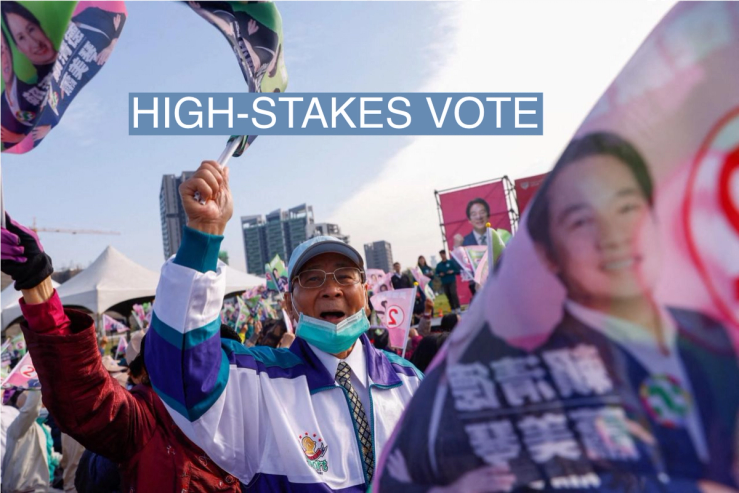The News
One of the thorniest issues in the U.S.-China relationship could become more complicated as Taiwan holds elections in the coming days.
The election this Saturday pits Lai Ching-te, of the ruling independence-minded Democratic Progressive Party, against Hou Yu-ih of the Kuomintang (KMT) party, which favors more engagement with Beijing (an outsider, Ko Wen-je, is also in the mix). The race is tight: Final polls show Lai with a slight edge.
A Lai victory would likely spur economic retaliation or a display of military power from Beijing, analysts say. Lai, who has angered China due to previous comments he made about being a “worker for Taiwan independence,” accused Beijing of widespread interference in the election earlier this week. China has attempted to sway the vote, both by overtly signaling which candidate it supports and through a misinformation campaign, said David Sacks, a fellow for Asia studies at the Council on Foreign Relations, despite warnings from President Biden and other officials not to interfere.
The U.S., which does not favor any one candidate in the election, plans to send an unofficial delegation to the self-governing island following the election to meet with the new president and other candidates, news that drew a negative reaction from China on Wednesday.
In this article:
Know More
Biden and Chinese leader Xi Jinping clashed over Taiwan during their summit in San Francisco in November, despite finding ways to work together in other areas. Xi told Biden directly during the meeting that Beijing planned to reunify Taiwan with mainland China, NBC reported. The Chinese side also unsuccessfully pressed the White House for a public statement of support for China’s goal of peaceful reunification.
China has, through non-governmental channels, also pressed the U.S. to use its influence to play a role in shaping what Lai says and does if he wins election, said Bonnie Glaser, managing director of the German Marshall Fund’s Indo-Pacific program, who said that message has been conveyed to her by Chinese scholars and others.
“They want the U.S. to rein him in, essentially, if he is elected,” Glaser told Semafor.
The U.S. is unlikely to heed any of those calls. “They’re looking for subtle shifts in U.S. rhetorical posture,” Sacks told Semafor. “And we’re not going to do that.”
Biden has warned China against military action against Taiwan, even going so far as to say U.S. forces would defend the island were it attacked by China. At the same time, the administration has not dropped the U.S.′ official “one China” policy, which does not recognize Taiwan as an independent country. The president “made clear that U.S. policy toward Taiwan has not and will not change,” a senior Biden administration official said of Biden’s meeting with Xi last year.
Morgan’s view
The meeting between Biden and Xi last year was a breath of fresh air for those looking for the U.S. and China to break their cycle of escalating tensions.
The two sides have plenty to disagree over, but agreements on restarting critical military-to-military communications and curbing fentanyl represented important developments.
A strong military reaction from China in the wake of Taiwan’s election would again raise tensions, however.
The senior Biden administration official acknowledged that administration members were having “contingency conversations” about potential responses, but declined to discuss details.
“We are deeply engaged in diplomacy with China to try to manage difficult situations. Our expectation is not that China is going to change its cross-Strait policy, it’s how we manage this difficult time and try to avoid unintended conflict,” the official said.
Some analysts believe Beijing will moderate its response to avoid worsening relations with the U.S. “I think that the Chinese have some incentives not to respond too forcefully right after the elections or even in the period between now and the inauguration,” said Glaser. “My sense is that Xi Jinping really wants a period of stability in the U.S.-China relationship.”
China’s own domestic economic pressures, for one, are a top concern. They have led Xi to do more to court foreign businesses, including those in the U.S., to attract foreign investment.
An upset victory by Hou could lead China to take more of a “carrot” approach rather than a “stick” approach, Sacks said. That could present different challenges for the U.S. if China were to try to convince Taiwan’s new administration to roll back some of its partnerships with the U.S. and other countries in exchange for deepened economic partnerships with Beijing.


